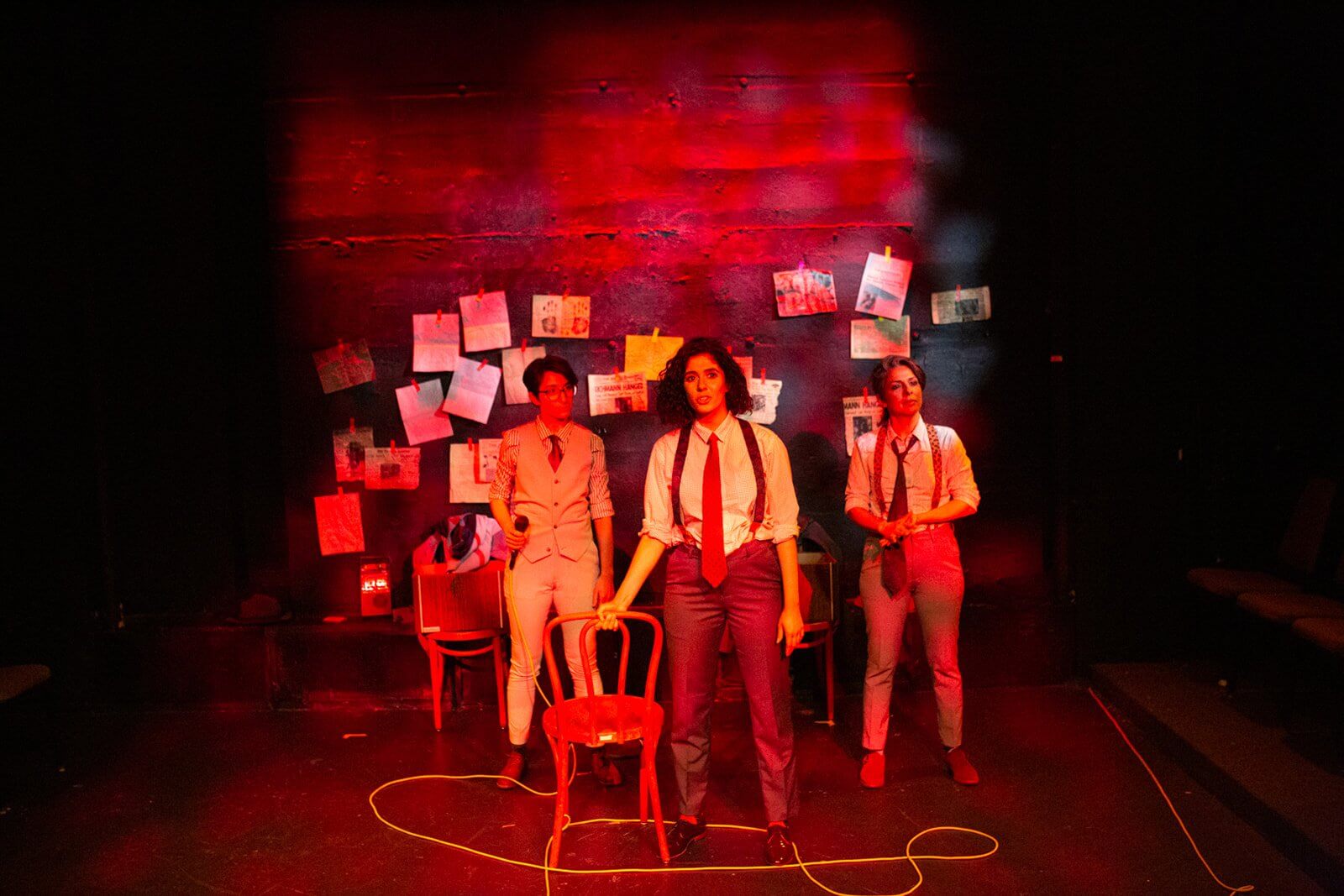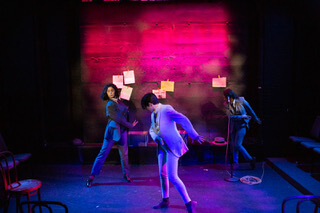Hannah Arendt is a detective solving the mystery of Eichmann in a new play
‘The Banality of Evil’ adapts Arendt’s famous dispatch from Jerusalem

Three versions of Hannah Arendt come together to solve the enigma of Adolf Eichmann in The Banality of Evil. Photo by Raven Watson
In 1963, writing her first seminal dispatch from the Eichmann trial in Jerusalem, Hannah Arendt observed that whoever built the Israeli Palace of Justice “obviously had a theater in mind.”
The space had an orchestra, balcony, proscenium and stage — complete with “side doors for the actors’ entrances.”
Prime Minister of Israel David Ben-Gurion was “the invisible stage manager of the proceedings,” prosecuting Eichmann, the architect of the Holocaust, for his crimes, Arendt wrote. “The audience is supposed to represent the whole world.”
Reading these words in 2020, in the early days of the pandemic, when theaters were shut down for the foreseeable future, director Jesse Freedman filed the idea away.
“When someone says this trial is like a theater, I’m like, ‘Man, what can I make out of this?’” said Freedman, the artistic director of Meta-Phys Ed., a theater company that makes plays from texts like the Talmud and the writings of Walter Benjamin.
At the time, Freedman was thinking about fascism and the United States that would emerge in the aftermath of Donald Trump. He had to wait until 2022 — during the Biden presidency — to workshop a piece based on Arendt’s book Eichmann in Jerusalem: A Report on the Banality of Evil. In this election year, he is debuting an expanded version, drawn from the first three chapters that imagines Arendt as a philosopher-detective in conversation with herself.
In the play, The Banality of Evil, opening March 21 at the Brick, Freedman and a cast of three physicalize Arendt’s concept of thought as a “two-in-one conversation,” with each actor playing a version of Arendt processing her observations. Set to 1960s jazz (notably Miles Davis’ score for Elevator to the Gallows) the piece is in a neo-noir style, complete with a back wall on which the actors tape evidence.

Reading Arendt, Freedman saw her investigation as akin to detective work — he noted that, in addition to her fellow philosophers, she was also known to read the mystery novels of Agatha Christie and Georges Simenon.
At the end of chapters, Arendt will seem to go on tangents, then refer back to the trial and offer an insight.
“It’s like you’re standing in the library with a detective saying, you know, ‘It was the butler with a lead pipe,'” Freedman said.
As the play goes on the Arendt detectives move from the “who done it” to the “why done it.”
“The question of the book is ‘Why did he do this?’” said Freedman, “How do you go from being basically a high school dropout, or kicked out of vocational school, a traveling vacuum oil salesman, to war criminal?”
Eichmann never appears as a character onstage, but his past (there were multiple versions that he presented at different points in his life) is left open for audiences to consider.
Having developed the work over years, Freedman says he’s leery of chasing headlines about contemporary Israel.
When he began rehearsing two years ago, he wasn’t thinking about antisemitism or the Israeli-Palestinian conflict. (Arendt scarcely mentions Palestinians at all.) The show is about Zionism, though, which Freedman says is newly topical. But, if Arendt made a huge splash in 1963, concluding that Eichmann was a rather insipid bureaucrat, Freedman isn’t looking to make a huge statement so much as to invite a nuanced discussion.
“Now is the time to try and understand things,” Freedman said, “To find language that is deeper and more accurate and more reflective.”
Arendt, who coined the term “Banality of Evil,” was leery of labels, Freedman said, and would likely reject the easy, unthinking slogans one sees on Instagram about the war in Gaza. For her, parroting phrases represented a degraded thinking central to Eichmann’s crimes.
“Whenever he was asked to give his reasons, he repeated the same embarrassed cliches,” Arendt observed of Eichmann. But what’s more, “this horrible gift from cliches did not leave him on his hour of death.”
“The Banality of Evil,” now a cliche, was once a fresh and even taboo concept. The play version asks that we appreciate how bold it was, and perhaps find inspiration in it for a new vocabulary.

















